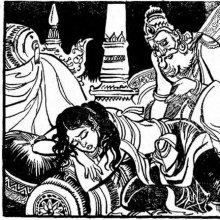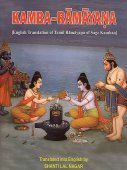Manthara, Mantharā, Mamthara: 16 definitions
Introduction:
Manthara means something in Hinduism, Sanskrit, Buddhism, Pali, Jainism, Prakrit. If you want to know the exact meaning, history, etymology or English translation of this term then check out the descriptions on this page. Add your comment or reference to a book if you want to contribute to this summary article.
Images (photo gallery)
In Hinduism
Purana and Itihasa (epic history)
Source: archive.org: Puranic Encyclopedia1) Mantharā (मन्थरा).—A maid of Kaikeyī the wife of Daśaratha. This hunchbacked woman was born of the species of a Gandharvī named Dundubhī. (Śloka 10, Chapter 276, Vana Parva). When everything was made ready to crown Śrī Rāma as the heir-apparent of Ayodhyā, it was Mantharā who persuaded Kaikeyī to go to Daśaratha and ask him to send Śrī Rāma to the forests. Had not the cruel tongue of Mantharā played like that, the history of the solar dynasty itself would have been different. (See under Kaikeyī).
2) Mantharā (मन्थरा).—Daughter of Virocana. (Sarga 25, Bālakāṇḍa, Vālmīki Rāmāyaṇa). Indra killed this Mantharā.

The Purana (पुराण, purāṇas) refers to Sanskrit literature preserving ancient India’s vast cultural history, including historical legends, religious ceremonies, various arts and sciences. The eighteen mahapuranas total over 400,000 shlokas (metrical couplets) and date to at least several centuries BCE.
General definition (in Hinduism)
Source: Apam Napat: Indian MythologyManthara was the house-maid of Kaikeyi, the queen of King Dasharatha. She had lived with the queen since her birth. The King had decided to make Rama, his eldest son (by his eldest wife Kausalya) as his heir-apparent, and Kaikeyi was glad at this news like everyone in the kingdom.
However, Manthara gave her evil advice, pointing out to her that she and her son Bharata would be second-class citizens henceforth. Acting on this advice, relying upon a boon that her husband had promised her, Kaikeyi got her son Bharata crowned as the heir instead, and got Rama exiled to the forest for fourteen years. Unable, to bear the thought of separation from his son, Dasharatha died of grief.
Source: WikiPedia: HinduismMantharā (मंथरा): Mantharā was a servant who convinced Kaikeyi that the throne of Ayodhya belonged to her son Bharata and that Rama should be exiled from the kingdom.
Languages of India and abroad
Pali-English dictionary
Source: BuddhaSasana: Concise Pali-English Dictionarymanthara : (m.) a tortoise.

Pali is the language of the Tipiṭaka, which is the sacred canon of Theravāda Buddhism and contains much of the Buddha’s speech. Closeley related to Sanskrit, both languages are used interchangeably between religions.
Sanskrit dictionary
Source: DDSA: The practical Sanskrit-English dictionaryManthara (मन्थर).—a. [manth-arac]
1) Slow, dull, tardy, lazy, inactive; गर्भमन्थरा (garbhamantharā) Ś.4; प्रत्यभिज्ञानमन्थरोऽभवत् (pratyabhijñānamantharo'bhavat) ibid; स्थाने खल्वयं प्रसवमन्थरोऽभूत् (sthāne khalvayaṃ prasavamantharo'bhūt) M.5; दरमन्थरचरणविहारम् (daramantharacaraṇavihāram) Gītagovinda 11; Śiśupālavadha 6.4;7.18;5.62; R.19.21.
2) Stupid, foolish, silly; मन्थरकौलिकः (mantharakaulikaḥ).
3) Low, deep, hollow, having a low tone.
4) Large, broad, wide, big.
5) Bent, crooked, curved.
6) Indicating, showing (sūcaka).
-raḥ 1 A store, treasure.
2) The hair of the head.
3) Wrath, anger.
4) Fresh butter.
5) A churning-stick.
6) Hindrance, an obstacle.
7) A stronghold.
8) Fruit.
9) A spy, an informer.
1) The month Vaiśākha.
11) The mountain Mandara.
12) An antelope.
-rā Name of a humpbacked nurse or slave of Kaikeyī who instigated her mistress, on the eve of Rāma's coronation as heir-apparent, to beg of her husband by the two boons formerly promised to her by him, the banishment of Rāma for fourteen years and the installation of Bharata on the throne; मन्थरां प्रविशस्वादौ कैकेयीं च ततः परम् (mantharāṃ praviśasvādau kaikeyīṃ ca tataḥ param) A. Rām.
-ram Safflower.
Source: Cologne Digital Sanskrit Dictionaries: Shabda-Sagara Sanskrit-English DictionaryManthara (मन्थर).—mfn.
(-raḥ-rā-raṃ) 1. Slow, lazy, tardy. 2. Large, bulky. 3. Curved, bowed, crooked. 4. Stupid, dull, a fool. 5. Low, vile, little. 6. Low, hollow, (as sound.) m.
(-raḥ) 1. A soldier marching slowly. 2. A spy, an informer. 3. A treasury, a store, a repertory. 4. Fruit. 5. An obstacle, a hindrance. 6. A churning-stick. 7. Fresh butter. 8. The month Vaisak'ha. 9. Passion, wrath. 10. A deer. 11. A fort, a strong-hold. 12. The mountain Mandara. 13. The hair of the head. n.
(-raṃ) Safflower. f.
(-rā) Name of the favourite female slave of Kaikeyi. the favourite wife of Dasaratha. E. manth to agitate, &c. aff. arac .
Source: Cologne Digital Sanskrit Dictionaries: Benfey Sanskrit-English DictionaryManthara (मन्थर).—[manth + ara], I. adj. 1. Slow, [Daśakumāracarita] in
Manthara (मन्थर).—[adjective] slow, lazy, tardy; dull, stupid; [feminine] ā [Name] of a woman. °— & [neuter] [adverb]; [abstract] tā [feminine]
Source: Cologne Digital Sanskrit Dictionaries: Monier-Williams Sanskrit-English Dictionary1) Manthara (मन्थर):—mf(ā)n. (allied to √2. mand and manda, but in some meanings rather [from] √math) slow ([literally] and [figuratively]; often ifc. ‘slow in’), lazy, tardy, indolent, dull, stupid, silly, [Kāvya literature; Rājataraṅgiṇī; Sāhitya-darpaṇa] etc. (am ind.)
2) low, hollow, deep (as sound), [Horace H. Wilson]
3) bent, curved, crooked, humpbacked (cf. ā f. and mantharaka)
4) broad, wide, large, bulky, [cf. Lexicographers, esp. such as amarasiṃha, halāyudha, hemacandra, etc.]
5) tale-bearing, [cf. Lexicographers, esp. such as amarasiṃha, halāyudha, hemacandra, etc.]
6) m. a treasure or hair or anger (= kośa, keśa, or kopa), [cf. Lexicographers, esp. such as amarasiṃha, halāyudha, hemacandra, etc.]
7) fruit, [cf. Lexicographers, esp. such as amarasiṃha, halāyudha, hemacandra, etc.]
8) a spy, [cf. Lexicographers, esp. such as amarasiṃha, halāyudha, hemacandra, etc.]
9) an antelope, [cf. Lexicographers, esp. such as amarasiṃha, halāyudha, hemacandra, etc.]
10) of the month Vaiśākha, [cf. Lexicographers, esp. such as amarasiṃha, halāyudha, hemacandra, etc.]
11) a fortress, stronghold, [cf. Lexicographers, esp. such as amarasiṃha, halāyudha, hemacandra, etc.]
12) an obstacle, hindrance, [cf. Lexicographers, esp. such as amarasiṃha, halāyudha, hemacandra, etc.]
13) whirling, [cf. Lexicographers, esp. such as amarasiṃha, halāyudha, hemacandra, etc.]
14) a churning-stick, [cf. Lexicographers, esp. such as amarasiṃha, halāyudha, hemacandra, etc.]
15) the mountain Mandara, [Horace H. Wilson] (cf. manthaparvata)
16) Name of a tortoise, [Hitopadeśa]
17) Mantharā (मन्थरा):—[from manthara] f. Name of a humpbacked female slave of Bharata’s mother Kaikeyī ([according to] to [Mahābhārata] an incarnation of the Gandharvī Dundubhī; [according to] to [Rāmāyaṇa] a daughter of Virocana)
18) Manthara (मन्थर):—n. safflower.
Source: Cologne Digital Sanskrit Dictionaries: Yates Sanskrit-English DictionaryManthara (मन्थर):—[(raḥ-rā-raṃ) a.] Slow, lazy; large; crooked; stupid; low. m. Churning-stick; butter; a slow-going soldier; a spy; a store; fruit; obstacle; wrath; a fort; a deer; a mountain. n. A safflower.
Source: DDSA: Paia-sadda-mahannavo; a comprehensive Prakrit Hindi dictionary (S)Manthara (मन्थर) in the Sanskrit language is related to the Prakrit word: Maṃthara.
[Sanskrit to German]
Sanskrit, also spelled संस्कृतम् (saṃskṛtam), is an ancient language of India commonly seen as the grandmother of the Indo-European language family (even English!). Closely allied with Prakrit and Pali, Sanskrit is more exhaustive in both grammar and terms and has the most extensive collection of literature in the world, greatly surpassing its sister-languages Greek and Latin.
Prakrit-English dictionary
Source: DDSA: Paia-sadda-mahannavo; a comprehensive Prakrit Hindi dictionary1) Maṃthara (मंथर) in the Prakrit language is related to the Sanskrit word: Manthara.
2) Maṃthara (मंथर) also relates to the Sanskrit word: Manthara.
Prakrit is an ancient language closely associated with both Pali and Sanskrit. Jain literature is often composed in this language or sub-dialects, such as the Agamas and their commentaries which are written in Ardhamagadhi and Maharashtri Prakrit. The earliest extant texts can be dated to as early as the 4th century BCE although core portions might be older.
Kannada-English dictionary
Source: Alar: Kannada-English corpusMaṃthara (ಮಂಥರ):—
1) [adjective] = ಮಂದ [mamda]1 - 1 & 2.
2) [adjective] 3 characterised by or proceeding from mental dullness; foolish; senseless; stupid.
3) [adjective] depressed below the surrounding surface or normal elevation.
4) [adjective] bent; curved; crooked.
5) [adjective] wide; broad; spreding over a wide area.
--- OR ---
Maṃthara (ಮಂಥರ):—[noun] = ಮಂದ [mamda]2 - 2 & 3.
Kannada is a Dravidian language (as opposed to the Indo-European language family) mainly spoken in the southwestern region of India.
Nepali dictionary
Source: unoes: Nepali-English DictionaryManthara (मन्थर):—adj. 1. slow; sluggish; inert; idle; 2. spiritless; tardy; 3. stupid; dull; dim-witted;
Nepali is the primary language of the Nepalese people counting almost 20 million native speakers. The country of Nepal is situated in the Himalaya mountain range to the north of India.
See also (Relevant definitions)
Starts with (+1): Mantara-kenkaiyon, Mantaraccilai, Mantaracu, Mantarakacam, Mantarakam, Mantarakanti, Mantarakiri, Mantarakkal, Mantarakkonrai, Mantarameru, Mantaran, Mantaran-ceralirumporai, Mantarappun, Mantharagamin, Mantharai, Mantharaka, Mantharakaulika, Mantharaksharam, Mantharam, Mantharata.
Ends with: Daramanthara, Manimamthara, Parimanthara, Vimanthara.
Full-text (+40): Mukushtha, Makushtha, Mantharam, Parimanthara, Mantharita, Mantharaviveka, Daramanthara, Manthareshana, Mantharaka, Parimantharata, Mantharagamin, Mantharata, Vellaimantaram, Mantharakaulika, Mantavocai, Mamthara, Mantarakiri, Manthar, Vimanthara, Mantavicai.
Relevant text
Search found 18 books and stories containing Manthara, Mamthara, Maṃthara, Mantharā; (plurals include: Mantharas, Mamtharas, Maṃtharas, Mantharās). You can also click to the full overview containing English textual excerpts. Below are direct links for the most relevant articles:
Ramayana of Valmiki (by Hari Prasad Shastri)
Chapter 78 - The hunchback, Manthara, incurs Prince Shatrughna’s displeasure < [Book 2 - Ayodhya-kanda]
Chapter 7 - Shri Rama’s coming installation < [Book 2 - Ayodhya-kanda]
Chapter 9 - Queen Kaikeyi is resolved upon her evil design < [Book 2 - Ayodhya-kanda]
Garga Samhita (English) (by Danavir Goswami)
Verse 5.17.15 < [Chapter 17 - The Gopis Describe Their Remembrance of Sri Krsna]
Bhakti-rasamrta-sindhu (by Śrīla Rūpa Gosvāmī)
Verse 2.1.256 < [Part 1 - Ecstatic Excitants (vibhāva)]
Verse 2.1.234 < [Part 1 - Ecstatic Excitants (vibhāva)]
Manthara < [January – March, 1985]
The Hand of Destiny < [January – March, 1978]
Sumitra < [July-August 1931]
Mahabharata (English) (by Kisari Mohan Ganguli)
The Agni Purana (by N. Gangadharan)
Related products

